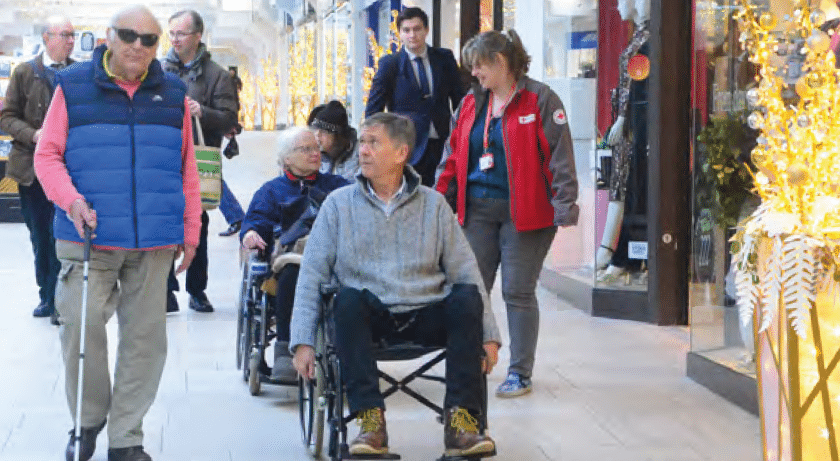A Tunbridge Wells Borough Councillor took to Royal Victoria Place to experience first-hand the challenges faced by disabled people in the community.
Cllr Hugo Pound (Labour) joined Anne Musker, Chair of the Tunbridge Wells & Area Access Group, alongside the Red Cross, in an attempt to gain a new perspective on accessibility in the town.
The Councillor was given a wheelchair and challenged to navigate everyday tasks in the shopping centre.
“It’s harder than I thought,” Cllr Pound told the Times. “Not only for the wheelchair user if they’re self-propelled but also for the person pushing if they have one. It’s hard work.”
Challenges included crossing the road, entering shops, and using accessible toilets, while either in a wheelchair or pushing one. “Until you’re in a wheelchair, you are unaware of gradients and cambers. When you’re able to walk, you make no account of them, but actually, they are quite significant.”
The exercise made it clear how even the simplest of tasks, such as using the toilet, required significant time and effort to complete.
“I think it’s a lack of understanding and a lack of care in planning and execution as we saw in the disabled toilet,” Cllr Pound recounted. “The bin was in the wrong place making it almost impossible to parallel park next to the loo.”
He added: “It’s little things that either people haven’t taken advice on from those who are challenged with mobility, or they just haven’t thought about it.”
Anne Musker, who is a wheelchair user, wanted to give the Councillor an experience of the challenges that disabled people face. “We could have more people willing to have a go,” she told the Times. “The more they know, the more they can stop and think and make adjustments.”
Being built on a hill, Tunbridge Wells poses a unique challenge to wheelchair users. The floor of Royal Victoria Place is on a slope, meaning that for many manual wheelchair users, the shopping centre is effectively a one-way system. “[We need] more options for powered wheelchair hire,” she commented. “Anybody will have to have power if they are going to be independent.”
Nevertheless, she remains optimistic: “It’s getting better all the time. There’s no doubt about it. We say in the disabled world that you’re only as disabled as your environment if it isn’t adapted to your needs.”
Anne hopes that by raising awareness of these challenges, accommodations will improve the accessibility of spaces to disabled people. “Generally, people’s hearts are in the right place. It’s just knowing,” she explained. “We want Royal Victoria Place, the Council and any other businesses with an interest in the centre to see what they can do more to help disabled people.”
The Tunbridge Wells & Area Access Group works across all parties to incorporate disabled people in the decision-making process.
Anne added: “If you have a provision that you think is right for disabled people, it’s probably a good idea to check in with disabled people to find out if you’ve got it right.”
Even so, the lack of disabled voices represented in our institutions can mean issues of accessibility are overlooked from the start.
“Disability is underrepresented generally in elected office partly because the way you get elected requires a huge amount of effort so there’s a big issue as to how you get more disabled MPs right down to Parish Councillors.”








